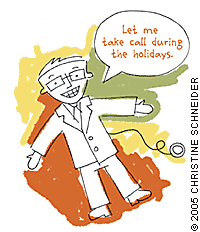
This doll tells people exactly what they want to hear.
Fam Pract Manag. 2005;12(8):68

During a recent holiday season, the novelty item “Mr. Wonderful” was a best seller. Mr. Wonderful is a handsome cloth doll, dressed in a blue work shirt and khaki pants, developed with the modern woman in mind. When you squeeze his hand, a soothing, masculine voice offers one of the following lines:
“You know, honey, why don’t you just relax and let me make dinner tonight.”
“Aaah, can’t your mother stay another week?”
“The ball game really isn’t that important; I’d rather spend time with you.”
“Let’s just cuddle tonight.”
“Actually, I’m not sure which way to go. I’ll turn in here and ask directions.”
“Here, you take the remote. As long as I’m with you, I don’t care what we watch.”
This got us thinking about “Dr. Wonderful” dolls and what they might look and sound like. They should look healthy and fit, but nerdy enough to reassure everyone that they studied a lot in school instead of goofing around. The doctor dolls should look old enough to know what they’re doing but young enough to be “up to date.” We would market at least four versions because different constituencies have mutually exclusive ideas about what Dr. Wonderful should say.
The version for patients would declare in a calm, reassuring voice:
“Don’t worry about insurance. Here’s your referral.”
“Oh, it is 3 a.m., isn’t it? That’s OK. I was already awake worrying about you. Thank you for calling.”
“I’ll be here as long as you need me. My spouse can cover for me at our daughter’s wedding.”
“Anyone can lose a prescription for pain pills. Allow me to write you a new one with refills to last you several years.”
“Go ahead and eat what you please. Do whatever feels good. My medicines will keep you living forever.”
The version marketed to hospital staff would look similar but say the following:
“Being with my friends in medical records makes the hours just fly by.”
“I’d be honored to serve on the fair hearing committee.”
“Thanks for staying up with me tonight. I appreciate the company.”
“Yes, you are too busy right now. I’m sorry I wrote that order ‘stat.’”
“You’re right. What do you think we should do?”
A version for partners and colleagues might say something like:
“Let me take call during the holidays.”
“You’re all so helpful. Please assign more of the overhead to me.”
“I would have handled the misdiagnosis the same way you did.”
“Here are the keys to my condo in Vail; have a great trip.”
“Why don’t you leave early today? I’ll see the rest of your patients.”
Finally, the version marketed to insurance carriers would say:
“Your formulary makes my prescribing decisions so much easier.”
“You’re right; that treatment is too new and experimental. What was I thinking?”
“Why should you take all the risk? Here, let me chip in.”
“Yes, my efficiency rating did fall this quarter. I’ll try to do better next time.”
“I understand about the cut in reimbursement. I enjoy medicine so much I’d do it for free if you let me.”
Sounds like a typical day around the office, right? No word yet on whether Dr. Wonderful does charts.